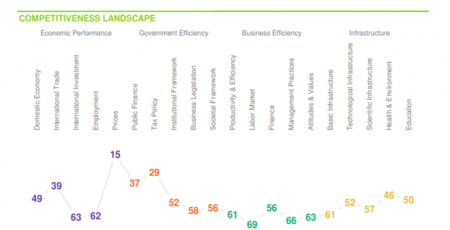BCCI directly contributes as a partner to this ranking by coordinating and organizing among its members the process of conducting a survey of Bulgarian companies and organizations that meet the criteria for the survey
Globally, the ranking calculates data from surveys and 164 statistical data. The survey was conducted between March and May 2025 among 6,162 local managers from 69 economies. Namibia, Kenya and Oman were new participants in this year's ranking.
According to the 2025 World Competitiveness Yearbook of the Institute for Management Development, Switzerland (Institute for Management Development – IMD), published on June 17, 2025, in 2025 Bulgaria ranks 57th out of 69 countries, an improvement from last year, when it was ranked 58th out of 67 economies. This result reflects both the positive aspects and the challenges the country faces. In 2021, the country ranked 53rd, but there have been significant fluctuations, reflecting various economic and political factors.
The top three countries in the 2024 IMD World Competitiveness Ranking are Switzerland, Singapore and Hong Kong (IMD World Competitiveness Ranking (WCR), with Canada, Germany and Luxembourg making the biggest progress in the top 20.
The main factors of Bulgaria's competitiveness profile include: economic performance (efficiency), government efficiency, business efficiency (environment) and infrastructure. Compared to the previous year 2024, the country has recorded a decline in terms of economic efficiency (from 45th to 50th place) and business environment (from 65th to 67th place).
However, Bulgaria has recorded growth in the infrastructure index (from 59th to 53rd place), thus stabilizing its position since 2023, when it was in 53rd place and then dropped by as much as 5 places in the 2024 indicator.
Bulgaria's economic performance indicator, As expected, it has strengths and weaknesses, and unfortunately, in all 5 indicators it has worsened its performance compared to the previous year. Bulgaria receives good marks for macroeconomic stability, with low inflation, a balanced current account balance and one of the lowest unemployment rates in the EU. Among the strengths of our country are also the available workforce, growing digital connectivity and growing exports of ICT services.
In the government efficiency indicator, we have positive growth in the ranking for all indicators (above in the graph), except for the tax policy indicator.
Some of the leading challenges and opportunities for improving Bulgaria's competitiveness in 2025, indicated in the report by the "Center for the Study of Democracy" are related to: corruption and lobbying, as well as the state of the judicial system, which act as a deterrent to investments and distort market competition and reforms;
brain drain, aging population, informal economy and skills shortages, innovation and growth, which suffer from underdeveloped capital markets, insufficient incentives for research and development, as well as the slow transition to a green and digital economy and weak energy innovation, etc.
Opportunities for improvement include strengthening the rule of law and reducing corruption, which will improve the business environment and attract investment. Investments in employee training, improving the education system, achieving greater synchronisation between business and education, facilitating the import of skilled labour, and increasing the motivation for the return of young and educated personnel can significantly improve the efficiency of the labour market. Prioritising infrastructure projects, especially in the areas of technology and education, will support long-term economic growth.
In conclusion, although Bulgaria faces significant challenges in improving its competitiveness, the country has significant strengths and opportunities. With targeted reforms and strategic investments, Bulgaria can improve its economic performance and take a more competitive position on the global scene.
According to Arturo Bris, Director of the World Competitiveness Center Switzerland:
“Regional disparities persist, with new gains in East Asia, Western Europe, West Asia, Africa and South America, and effective government performance is becoming a key factor in achieving long-term sustainability. Effective performance involves flexibility and responsiveness, inclusiveness and forward-looking policies and policy frameworks.
“Strong currencies are emerging as an indicator of long-term success,” said Arturo Bris, Director of the World Competitiveness Center. “At the same time, the reorganisation of global trade networks shows how easily accessible countries are acting

